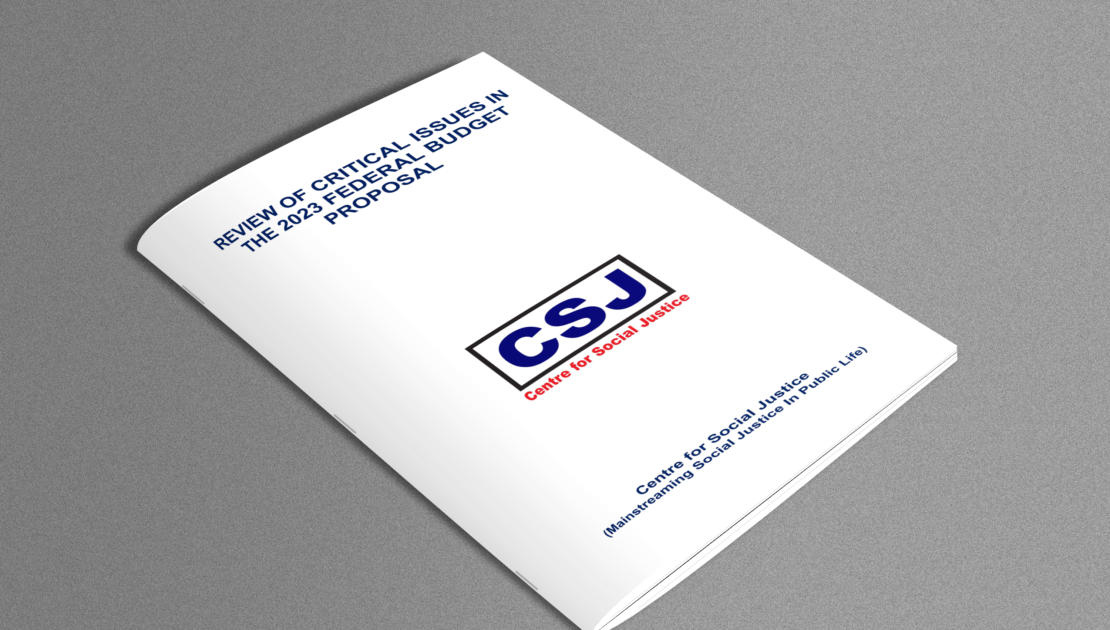CSJ Publishes Review Of Critical Issues In The 2023 Federal Budget Proposal
CSJ Publishes Review Of Critical Issues In The 2023 Federal Budget Proposal
-
December 9, 2022
- Posted by: Center for Social Justice

The Centre for Social Justice (CSJ) has published a review of critical issues in the 2023 federal budget proposal.
The review covered issues like service wide votes, deficit financing, oil price benchmark, fuel consumption and subsidy, oil production and oil theft, exchange rate, national debt, ways and means of the Central Bank of Nigeria, statutory transfers, capital expenditures and diaspora remittances.
An overview of the expenditure in the budget proposal shows that N20,507,942,180,704 is expected to be drawn from the consolidated revenue fund of the federation of which N744,109,46879,7 is for Statutory Transfers, N6,557,597,611,797 is for Debt Service, N8,271 882,354,405 is for Recurrent (Non-Debt) Expenditure while the sum of N4,934,352,745,705 is for contribution to the Development Fund for Capital Expenditure for the year.
On this expenditure, the review recommends that the capital vote be restructured with more emphasis placed on developmental capital in comparison with administrative capital. Allocations should be channeled towards concrete deliverables, targeting human and infrastructural development.
Service Wide Votes (SWV) of N3,006,583,068,440 in the proposed budget constitute 14.66% of the total expenditure. This is not a fit and good practice because the bulk of the SWVs could be better programmed and managed. Centralizing votes and managing them outside the traditional MDAs with little or no accountability is not in line with best practices. The review recommends that SWV should be abolished and items currently captured under it transferred to the Contingency Vote or to the appropriate MDAs.
Debt financing the 2023 budget proposal will contribute the largest share of 81.7 % followed by project-tied loans at 16.4% while privatization and asset sale will contribute 1.9%. As a radical departure from the mounting debt, the review recommended several revenue enhancing measures including independent revenue sources. On this, it recommends the mandatory use of a Treasury Single Account for all GOE financial transactions as stated in the MTEF and earlier civil society recommendations.
There is also a need to strengthen the administration and management of TSA to ensure that no expenditure and income is recorded outside its system. The review also recommends the full enforcement of extant laws limiting the cost-to-revenue ratio of GOEs to a maximum of 50 percent. This includes monthly remittance of interim operating surplus and reconciliation of cumulative remittances after year end should be converted to a monthly deduction by the Accountant General. The Federal Government need not wait for GOEs to remit but the platform should be set up in such a manner that facilitates automatic deduction thereby ensuring that the sums due to FGN are not under any circumstance available for GOE expenditure.
It is also recommended that prosecution and administrative sanctions be meted for unauthorized use of funds due to FGN as operating surplus. This should start from an automatic suspension process for the accounting officer of the GOE. Similar concrete recommendations were made on the other issues discussed in the budget proposal review.
Download the document below
Review Of Critical Issues In The 2023 Federal Budget Proposal
